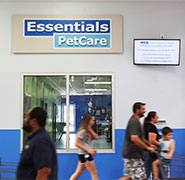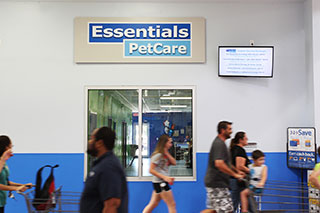

Photo by Brendan Fitterer
Essentials PetCare occupies 2,100 square feet at the front of a Wal-Mart. It has a separate entrance, but shoppers can see into the clinic through windows from the store vestibule.
A walk-in veterinary clinic that opened last month at a Wal-Mart store in western Florida could be the first of a chain of practices leasing space in the superstores.
The clinic in Port Richey, called Essentials PetCare, is owned by Dr. Douglas Spiker, a veterinarian, and his wife, Christine Battista. Spiker also is a partner at a six-doctor traditional veterinary clinic, Bluffs Animal Hospital, in Belleair Bluffs, about 30 miles to the south.
Spiker said the new clinic is designed to supplement, not supplant, conventional full-service veterinary hospitals. “Our goal is to reach those pet-owning families that don’t go to the veterinarian at all,” he said. “We’re not here to compete with any traditional practice.”
Toward that end, Essentials PetCare provides a limited list of services to dogs and cats: vaccinations, nail trims, microchips and anal-gland expression, along with care for uncomplicated conditions — ear infections, skin problems, eye trouble, lameness, urinary difficulties, stomach upset and diarrhea.
Pets needing emergency attention, hospitalization, X-rays, ultrasounds, dental cleanings, spaying, neutering or other surgery are referred elsewhere.
“Eliminating the need for expensive equipment and inventory allows us to offer the lowest prices possible on the essentials for pet health,” the clinic website explains.
The owners emphasize affordability and transparent pricing. Examples of prices, which are posted online, are $10 for a nail trim, $37.55 for a general exam and $66.74 for a “diarrhea package” that entails an exam by a veterinarian, basic diagnostics and treatment recommendations. The clinic does not stock drugs for sale, but provides prescriptions that owners can have filled at the pharmacy of their choice, Spiker said.
Spiker said he began thinking about how to draw more pet owners to veterinary clinics after reading industry reports such as the 2011 Bayer Veterinary Care Usage Study, which examined the reasons for a national decline in visits to companion animal hospitals. One factor the study identified was a perception among pet owners that regular checkups aren’t necessary. Another was the cost of care.
Spiker said the issues of affordability and accessibility inspired him to approach Wal-Mart with the idea of a basic-services veterinary practice. The world’s largest brick-and-mortar retailer has 5,283 locations in the United States alone, 3,499 of them the company’s iconic “supercenters.” Wal-Mart’s goal, as Spiker sees it, is “to improve people’s basic lives by saving them money.”
“That’s a company that really has value-driven philosophy,” he said. “People know when they they hear the name ‘Wal-Mart’ or think of ‘Wal-Mart,’ they think of the lowest price … for any item.”
Moreover, he said, “We believe Wal-Mart is a very familiar shopping destination for our targeted pet-owning demographic.”
Getting an audience with the retail giant wasn’t simple. “We had to find the right people that we knew would provide us the access we needed to go in and pitch,” he said.
Wal-Mart was receptive. The clinic opened on Sept. 6.
“We think this will be a really valuable service to our customers,” Wal-Mart spokeswoman Molly Blakeman said.
Wal-Mart regularly leases space at the front of its buildings to “tenants we think will be a great fit in our stores and make Wal-Mart even more of a one-stop shop,” Blakeman continued. She said tenants are a mixture of national vendors such as McDonald’s, and regional vendors such as nail salons.
Blakeman called the clinic in the Port Richey store a pilot. “We’re excited to see how our customers respond, and we’ll move from there.”
The clinic has a separate entrance from the store. “That was important to Wal-Mart; pets aren’t allowed in the Wal-Mart stores,” Spiker explained.
To accommodate shopping, Essentials will hold patients for up to 30 minutes while their owners run into the store. Spiker said so far, no one has abused the service and left a pet too long.
Clinic staff also routinely inform clients not to leave pets in cars; a warning is printed on intake paperwork, as well, Spiker said. “We’re on the west coast of Florida. It’s always hot,” he said. “I think owners are aware of the risks of leaving their pet in the car. It’s an educated population.”
The clinic, which is open daily, doesn’t take appointments. To date, wait times have ranged from zero to 45 minutes, Spiker said. At least one veterinarian is present at all times, he said; four veterinarians rotate through on a part-time basis. That doesn’t include Spiker, who sometimes sees patients at Essentials but more typically serves as a manager.
The prospect of a chain of veterinary clinics associated with Wal-Mart has attracted a mixture of concerns and well wishes from the veterinary community.
Dr. Geoffrey Adams, a solo practitioner who owns a hospital about five miles from the new Wal-Mart-based clinic, expressed concern that the enterprise will pull business from traditional animal hospitals, despite the intentions of its owners.
“I think a lot of ventures like this minimize the importance of cost-conscious clients to an average veterinary practice,” he said in an interview by email. “In my area, Wal-Mart is an important center of commerce and undoubtedly will attract many new clients that would otherwise go elsewhere in hopes to save on what they perceive is a commodity.”
At the same time, Adams is hopeful that the clinic opening is a sign of a local rebound economically. In the Tampa-St. Petersburg-Clearwater metropolitan area, the median income is below the national average.
“My area was hit very hard by the housing recession,” Adams said. “No way would this have come about back then. Maybe this is a sign that things are really recovering. I mean, the largest retailer in the world has to know a good area when they do this.”
The concept of placing veterinary clinics in retail stores is not new. Banfield Pet Hospital, the largest owner of veterinary clinics in the country, has about 960 locations, 90 percent of which are inside PetSmart pet stores. Banfield president and CEO Vincent Bradley said by email that he sees the Essential PetCare model as more comparable to mobile clinics and vaccination clinics than Banfield hospitals, which provide a full array of services.
“Our firm belief is that millions of pets in the United States do not receive the care they need. This is due to many factors, but increasing options and accessibility to veterinary care is a positive for the profession,” Bradley said. “We welcome this new model and hope that they reach a new audience of pet owners. We believe full-service hospitals will benefit from referrals and additional services that these clinics may not be able to offer.”
Spiker said clients who already have a regular veterinarian and express interest in switching to Essentials PetCare are discouraged from doing so, “the reason being, we don’t have the full-service offerings,” he said. “We stress the importance of being with a doctor and a staff that they’re already familiar with, and the importance of the expanded model of traditional veterinary hospitals. And the importance, if the pet falls ill, of the staff being familiar with the pet.”
He said the vast majority of pets that have come to the clinic thus far are “in dire need” of basic services and many have not seen a veterinarian in five years or more, if ever.
The clinic already has referred patients to other veterinarians, he said. He believes one such referral likely saved the life of a little dog.
The dog had been drinking excessively and losing weight, it was intermittently lethargic and losing fur. The owner did not realize these were signs of illness; she just wanted a rabies shot. The veterinarian recommended lab work. Tests revealed that the dog had diabetic ketoacidosis, a potentially fatal condition that develops when a body’s blood-glucose level is high for a prolonged period, causing what Spiker described as a kind of metabolic derangement.
“The pet was able to get into a full-service facility on a Friday night and, as far as we know, is thriving today,” Spiker said.
Asked whether Essentials PetCare might eventually evolve into a full-service clinic, Spiker said no. “Our goal is to extend veterinary care to a broader portion of the pet-owning market,” he reiterated. “… Our mission is very basic, very high-quality preventive care.”
He said the company’s initial goal for growth is within Florida. The company also is exploring selling franchise ownerships.